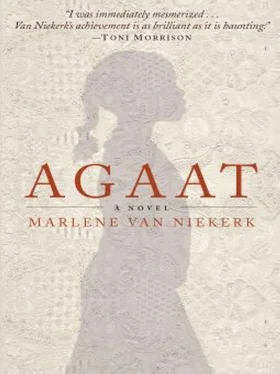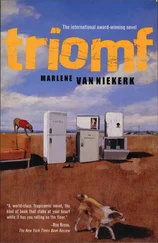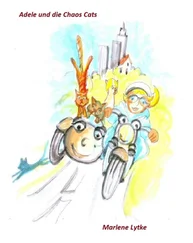Sometimes, Agaat said, and what she said did not accord with her tone, sometimes I wish I could. .
You looked round. There she stood, the iron poker in her strong hand. It was superficially evident that she was referring to Jak, to something that she wanted to do to him. But her gaze was fixed on you.
Get out of here, you managed to say, it’s none of your business.
It is, she said, and flung the poker into the copper tray, it is most certainly my business.
Did she say that? Had you heard correctly?
Get out of here, immediately, Jak said.
Without looking at you, she walked out with rapid little steps and her head high. If she didn’t say it, her crooked drawn-up shoulder said it: It’s the only business I have, you and your husband and your child and your buggering around.
You kept wondering about Jak in that time when Jakkie went to the border. From his first breakdown on the night of his great nursery rhyme — how old was Jakkie then? eleven, twelve? — you felt that he was working at and building and adjusting his theory of you, of who you were, and what you had done to him. It hurt more than any shove or slap.
So if you don’t want to help me with the garden, you said, please do go ahead and write it up some time, all the stories that you’ve been accumulating against me for years, everything that you sit and think up about me, so that I can read it, because I don’t get the whole picture, only the tirades and the obscure parables.
Go ahead and write yourself, it’s no use your trying to pretend all of a sudden that you’re interested in what I think, I’ve been thinking it for a long time and I’ve been saying it for a long time, from the very start. Your problem is that that you don’t notice a thing, Milla. And now all of a sudden you want me to be your gardener, get knotted, I say.
You were sorry for him. His face and still-fit body were at last starting to show their age. It wasn’t only yourself, you realised, you wanted to console him as well with the garden, you wanted to soothe him as well. You woke up one Sunday morning towards six o’clock with the garden layout practically complete in your mind.
Jak was away, the house was quiet. On Sunday mornings Agaat was off duty. You walked to the kitchen to make yourself some coffee. On an impulse you walked out into the backyard in your nightdress and knocked on the upper door of the outside room. It was wide open.
Come, I’m making us some nice coffee and rusks, I have a wonderful idea, Agaat, you must help me.
You started talking before you’d seen her. Your words dried up when you looked into her eyes.
The curtains were open. The room was bright with light. Agaat was sitting and embroidering in the deep chair in front of the window, her bare feet on a little mat of sewn-together moleskins. She was without her cap. Her hair radiated in combed-out peaks from her head. It was the first time in twenty years that you’d seen her without her cap. You felt as if you’d caught her naked, but you stood there and kept gazing.
The unkempt hair mass made her look feral. You wanted to look away, but you couldn’t. The hair filled the otherwise tidy room like a conspiracy against everything in league with daylight and subordination. From the enormity of hair your eyes strayed to the grisly cement-work around the fireplace. To and fro you looked, at her head and at the clusters of shells and skulls and quartz pebbles and marbles and little slivers of iron, rivets. It was as if Agaat had recreated her unkempt self there in low relief.
Her embroidery basket was standing by her feet, with the tight balls of thread and needles stuck into their proper places in the pockets and loops. The high white bed was immaculately made, with all her large embroidered pillows neatly arranged against the bedpost. On her clothes-rail the black dresses and the white aprons hung neatly serried. On the shelf above, fitted into one another three-by-three, the starched white caps, densely embroidered like mitres. But all of that, plus the zinc bath in its place under the washbasin, the table scrubbed white, the kettle shiny with scouring, the hearth-opening clean, the buffed noses of three pairs of black school shoes peeping out from under the curtain in front of the apple-crate cupboard, the Singer’s black body neatly folded back into the stowaway cavity, was not enough to reassure you. The clumps of steel wool on her head, the manner in which she looked at you in her ungroomed state, there where you stood in the door, yourself with sleep-fuzzed hair and an unwashed face, with your thin shins and white knees sticking out from under your pink flannel bed-jacket, that unnerved you. You clutched the front of your nightdress, even though it was buttoned. You felt as if she were assessing you naked.
I’m coming, she said, and stuck out her chin to manifest her displeasure, but the effect of it, without the cap, was one of vulnerability.
With an odd, reprimanded feeling you went and flung on a dress and dragged a comb through your hair so that when you went to sit down at the kitchen table you would at least not compare unfavourably with her. You knew how snow-white-starched she would report for duty.
She declined the rusk and drank her coffee with tight little sips. Her chin was stuck out and she listened to your plan with her eyes fixed to the wall, her cap a rampart before her head.
You had to control yourself not just to gather again all the papers and the coloured pencils and the gardening books that you’d set out and say to her she may leave now, thank you. Why should you suddenly become an apologist for your idea? A sort of sycophantish subordinate?
But you didn’t want to give up, you wouldn’t let yourself be quenched, and you changed your tack, excitedly you explained, elbows on the table, as lightly and merrily as you could.
Was she upset because you’d seen her embroidery-work? Nobody was ever allowed to see Agaat’s creations before they were quite complete, the cloth neatly washed and ironed and spread out for inspection. And this one was a huge cloth that she must have started that very morning, only the edges had been seamed. Were there sleeves attached? A neck-hole? You didn’t want to look too hard. Those unruly wads bowed over the fine white cloth, the hand working rapidly and accurately with the needle. It was the sight of that that suddenly made you feel terribly guilty about the letter. The one that you’d read over and over again. How long had it been in your handbag before you’d eventually posted it? Had you ever posted it?
Without looking up you filled one page after the other with your drawings and slid them in front of Agaat. One to explain the structure of the terraces, wider and narrower for variation, with stone walls and connecting steps that were supposed to lead the eye to the front door of the homestead. One to explain the scheme of arches and arcades and trellises that would grant the visitor access to prettily framed pictures of the garden. Another one to chart the location of the fountain and the fish ponds and the watercourses connecting them with one another, and one to indicate the irrigation pipes. The last one was to illustrate the colour scheme, blue and purple and white and green would predominate, with here and there an accent of bronze and copper and ochre. And then on the west side there had to be a formal herb garden with everything fragrant and tasty, with a sundial in the centre and paths of fine gravel as you’d seen in the books.
You took your time over every map, coloured in the levels unhurriedly, and kept talking softly all the time as if to yourself before presenting the end result at higher volume.
Coax, you thought, soft-soap, even it if takes hours. At length you got up to fetch a jar of green-fig preserve, Agaat’s favourite, from the pantry shelf. It was eleven o’clock and perhaps she could be won over with something to eat. Bread and butter and green figs. Anything to get her to open her mouth.
Читать дальше












